Challenges of Kmart's Expansion in South Korea: MGT211 Report
VerifiedAdded on 2022/10/11
|11
|2188
|11
Report
AI Summary
This report analyzes the potential challenges Kmart faces when expanding into South Korea, considering the significant cultural differences between Australia and South Korea. The report utilizes frameworks such as Hofstede Insights, Trompenaars cultural analysis, the Globe project, and Hall's Cultural Framework to assess these differences, focusing on aspects like power distance, individualism, masculinity, uncertainty avoidance, long-term orientation, and indulgence. The findings highlight potential issues in leadership, staff handling, communication, and marketing. The report then provides recommendations for Kmart, including employee training, cultural sensitivity initiatives, and exploration of different market entry modes, such as direct exporting, joint ventures, and foreign direct investment. The conclusion emphasizes the need for cultural adaptation and strategic planning for successful expansion. The report provides a comprehensive overview of the cross-cultural management challenges and offers actionable insights for Kmart's international venture.
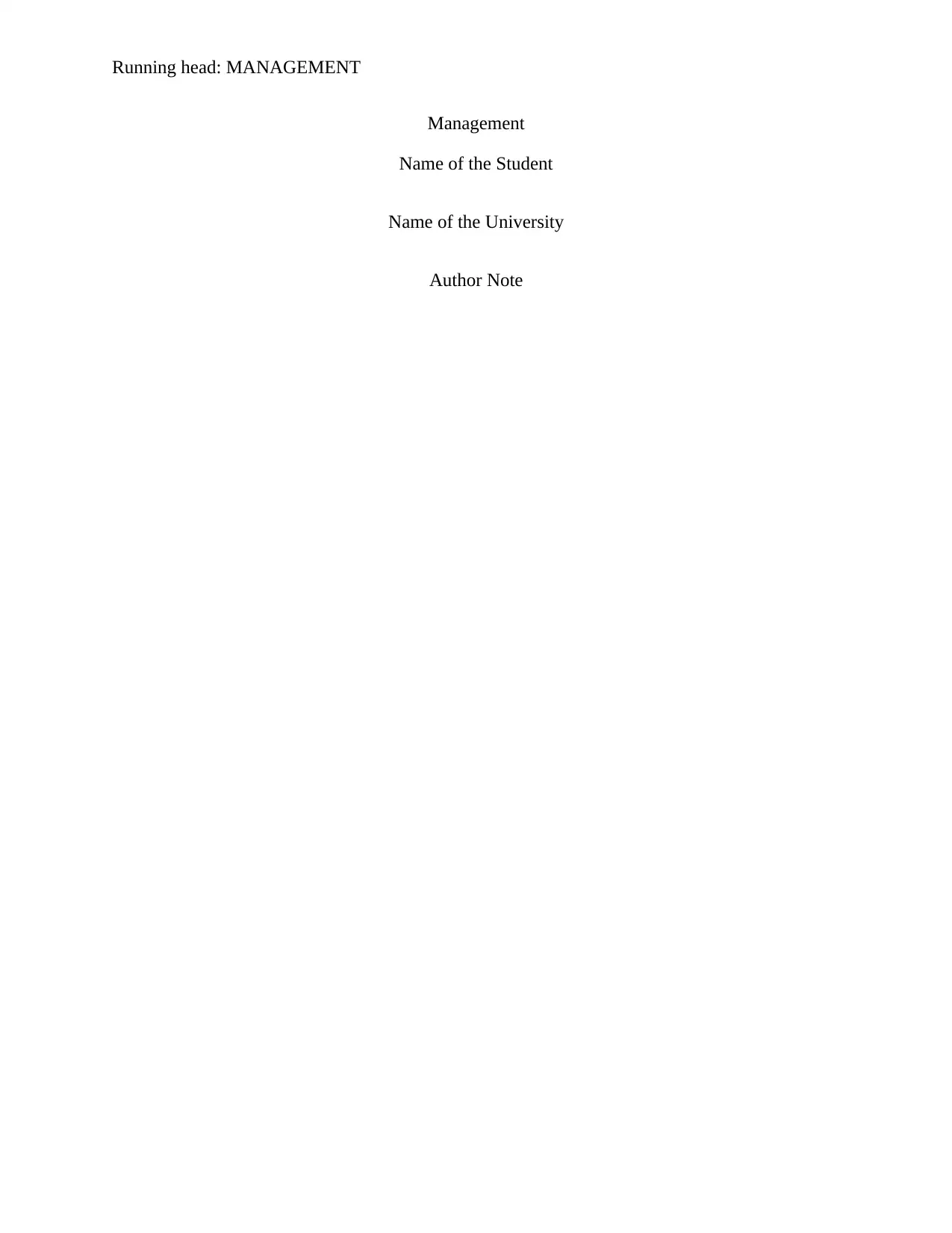
Running head: MANAGEMENT
Management
Name of the Student
Name of the University
Author Note
Management
Name of the Student
Name of the University
Author Note
Paraphrase This Document
Need a fresh take? Get an instant paraphrase of this document with our AI Paraphraser
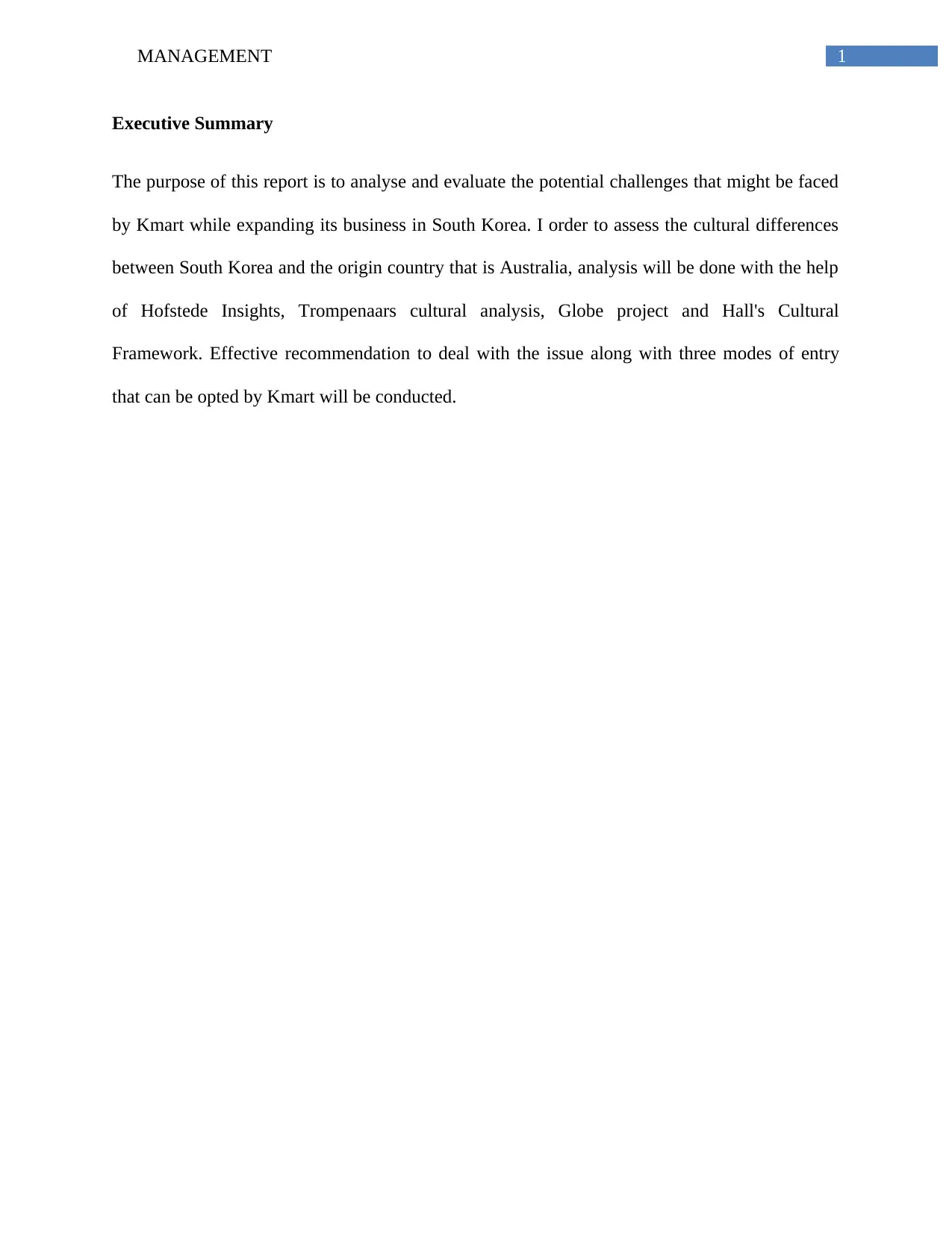
1MANAGEMENT
Executive Summary
The purpose of this report is to analyse and evaluate the potential challenges that might be faced
by Kmart while expanding its business in South Korea. I order to assess the cultural differences
between South Korea and the origin country that is Australia, analysis will be done with the help
of Hofstede Insights, Trompenaars cultural analysis, Globe project and Hall's Cultural
Framework. Effective recommendation to deal with the issue along with three modes of entry
that can be opted by Kmart will be conducted.
Executive Summary
The purpose of this report is to analyse and evaluate the potential challenges that might be faced
by Kmart while expanding its business in South Korea. I order to assess the cultural differences
between South Korea and the origin country that is Australia, analysis will be done with the help
of Hofstede Insights, Trompenaars cultural analysis, Globe project and Hall's Cultural
Framework. Effective recommendation to deal with the issue along with three modes of entry
that can be opted by Kmart will be conducted.
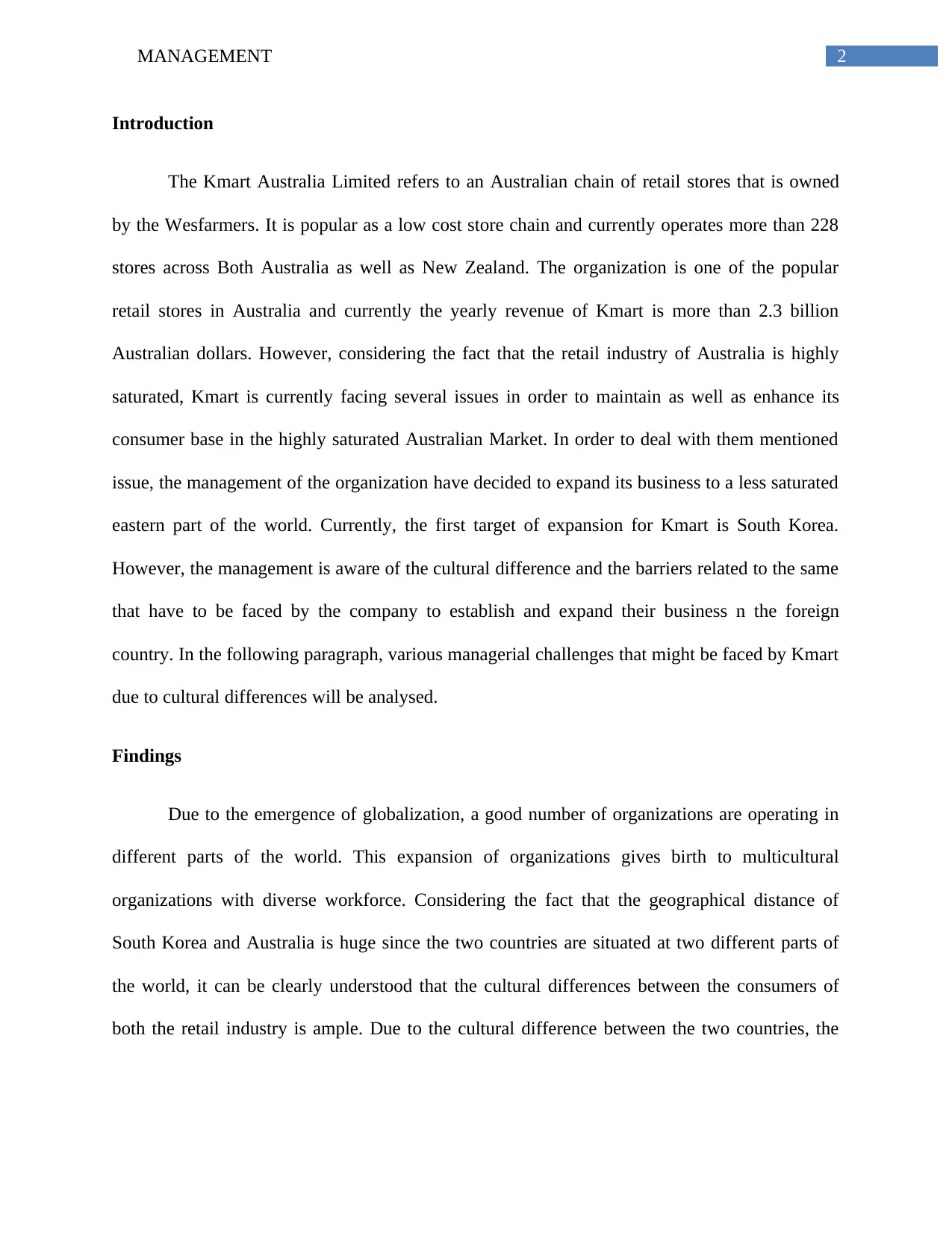
2MANAGEMENT
Introduction
The Kmart Australia Limited refers to an Australian chain of retail stores that is owned
by the Wesfarmers. It is popular as a low cost store chain and currently operates more than 228
stores across Both Australia as well as New Zealand. The organization is one of the popular
retail stores in Australia and currently the yearly revenue of Kmart is more than 2.3 billion
Australian dollars. However, considering the fact that the retail industry of Australia is highly
saturated, Kmart is currently facing several issues in order to maintain as well as enhance its
consumer base in the highly saturated Australian Market. In order to deal with them mentioned
issue, the management of the organization have decided to expand its business to a less saturated
eastern part of the world. Currently, the first target of expansion for Kmart is South Korea.
However, the management is aware of the cultural difference and the barriers related to the same
that have to be faced by the company to establish and expand their business n the foreign
country. In the following paragraph, various managerial challenges that might be faced by Kmart
due to cultural differences will be analysed.
Findings
Due to the emergence of globalization, a good number of organizations are operating in
different parts of the world. This expansion of organizations gives birth to multicultural
organizations with diverse workforce. Considering the fact that the geographical distance of
South Korea and Australia is huge since the two countries are situated at two different parts of
the world, it can be clearly understood that the cultural differences between the consumers of
both the retail industry is ample. Due to the cultural difference between the two countries, the
Introduction
The Kmart Australia Limited refers to an Australian chain of retail stores that is owned
by the Wesfarmers. It is popular as a low cost store chain and currently operates more than 228
stores across Both Australia as well as New Zealand. The organization is one of the popular
retail stores in Australia and currently the yearly revenue of Kmart is more than 2.3 billion
Australian dollars. However, considering the fact that the retail industry of Australia is highly
saturated, Kmart is currently facing several issues in order to maintain as well as enhance its
consumer base in the highly saturated Australian Market. In order to deal with them mentioned
issue, the management of the organization have decided to expand its business to a less saturated
eastern part of the world. Currently, the first target of expansion for Kmart is South Korea.
However, the management is aware of the cultural difference and the barriers related to the same
that have to be faced by the company to establish and expand their business n the foreign
country. In the following paragraph, various managerial challenges that might be faced by Kmart
due to cultural differences will be analysed.
Findings
Due to the emergence of globalization, a good number of organizations are operating in
different parts of the world. This expansion of organizations gives birth to multicultural
organizations with diverse workforce. Considering the fact that the geographical distance of
South Korea and Australia is huge since the two countries are situated at two different parts of
the world, it can be clearly understood that the cultural differences between the consumers of
both the retail industry is ample. Due to the cultural difference between the two countries, the
⊘ This is a preview!⊘
Do you want full access?
Subscribe today to unlock all pages.

Trusted by 1+ million students worldwide
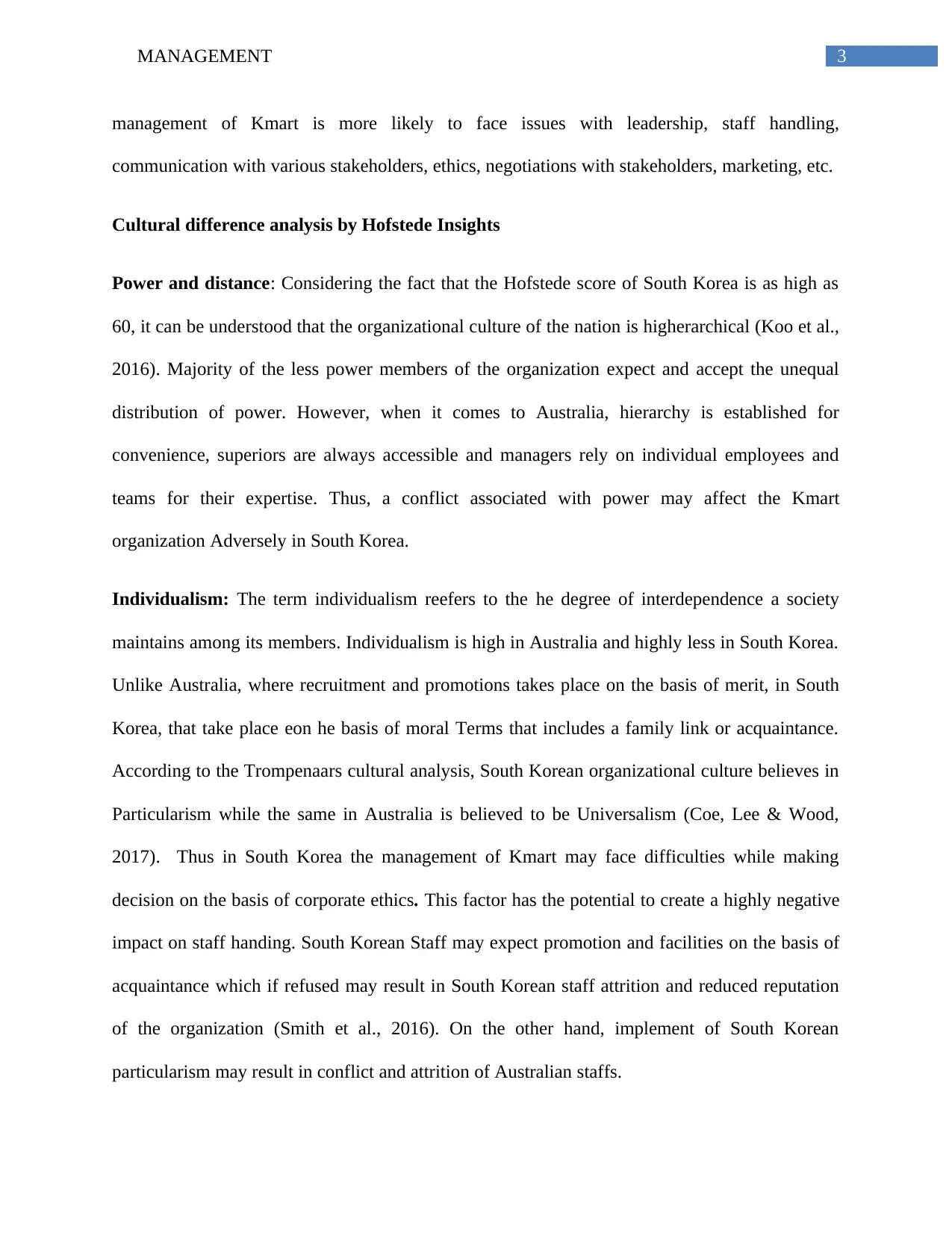
3MANAGEMENT
management of Kmart is more likely to face issues with leadership, staff handling,
communication with various stakeholders, ethics, negotiations with stakeholders, marketing, etc.
Cultural difference analysis by Hofstede Insights
Power and distance: Considering the fact that the Hofstede score of South Korea is as high as
60, it can be understood that the organizational culture of the nation is higherarchical (Koo et al.,
2016). Majority of the less power members of the organization expect and accept the unequal
distribution of power. However, when it comes to Australia, hierarchy is established for
convenience, superiors are always accessible and managers rely on individual employees and
teams for their expertise. Thus, a conflict associated with power may affect the Kmart
organization Adversely in South Korea.
Individualism: The term individualism reefers to the he degree of interdependence a society
maintains among its members. Individualism is high in Australia and highly less in South Korea.
Unlike Australia, where recruitment and promotions takes place on the basis of merit, in South
Korea, that take place eon he basis of moral Terms that includes a family link or acquaintance.
According to the Trompenaars cultural analysis, South Korean organizational culture believes in
Particularism while the same in Australia is believed to be Universalism (Coe, Lee & Wood,
2017). Thus in South Korea the management of Kmart may face difficulties while making
decision on the basis of corporate ethics. This factor has the potential to create a highly negative
impact on staff handing. South Korean Staff may expect promotion and facilities on the basis of
acquaintance which if refused may result in South Korean staff attrition and reduced reputation
of the organization (Smith et al., 2016). On the other hand, implement of South Korean
particularism may result in conflict and attrition of Australian staffs.
management of Kmart is more likely to face issues with leadership, staff handling,
communication with various stakeholders, ethics, negotiations with stakeholders, marketing, etc.
Cultural difference analysis by Hofstede Insights
Power and distance: Considering the fact that the Hofstede score of South Korea is as high as
60, it can be understood that the organizational culture of the nation is higherarchical (Koo et al.,
2016). Majority of the less power members of the organization expect and accept the unequal
distribution of power. However, when it comes to Australia, hierarchy is established for
convenience, superiors are always accessible and managers rely on individual employees and
teams for their expertise. Thus, a conflict associated with power may affect the Kmart
organization Adversely in South Korea.
Individualism: The term individualism reefers to the he degree of interdependence a society
maintains among its members. Individualism is high in Australia and highly less in South Korea.
Unlike Australia, where recruitment and promotions takes place on the basis of merit, in South
Korea, that take place eon he basis of moral Terms that includes a family link or acquaintance.
According to the Trompenaars cultural analysis, South Korean organizational culture believes in
Particularism while the same in Australia is believed to be Universalism (Coe, Lee & Wood,
2017). Thus in South Korea the management of Kmart may face difficulties while making
decision on the basis of corporate ethics. This factor has the potential to create a highly negative
impact on staff handing. South Korean Staff may expect promotion and facilities on the basis of
acquaintance which if refused may result in South Korean staff attrition and reduced reputation
of the organization (Smith et al., 2016). On the other hand, implement of South Korean
particularism may result in conflict and attrition of Australian staffs.
Paraphrase This Document
Need a fresh take? Get an instant paraphrase of this document with our AI Paraphraser
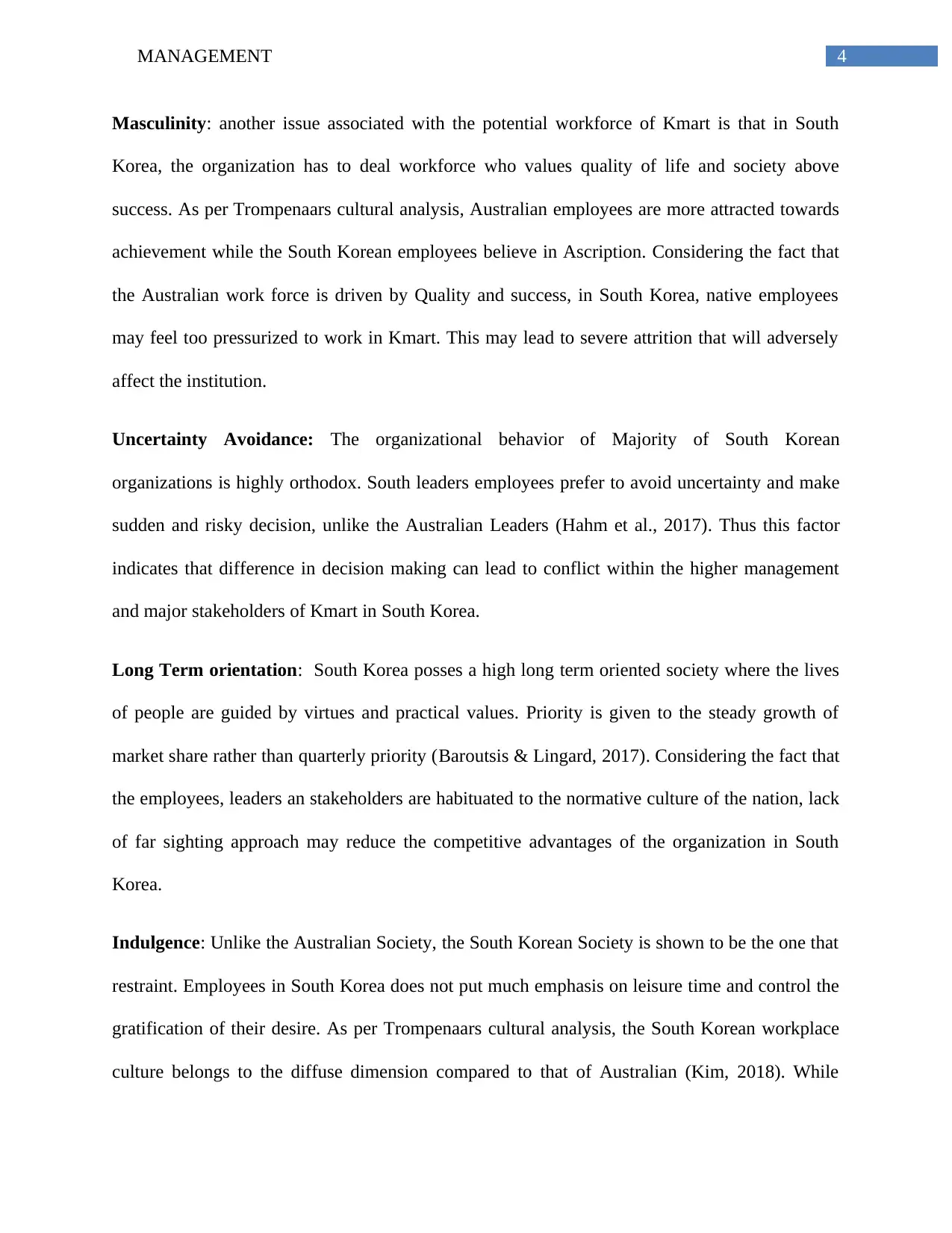
4MANAGEMENT
Masculinity: another issue associated with the potential workforce of Kmart is that in South
Korea, the organization has to deal workforce who values quality of life and society above
success. As per Trompenaars cultural analysis, Australian employees are more attracted towards
achievement while the South Korean employees believe in Ascription. Considering the fact that
the Australian work force is driven by Quality and success, in South Korea, native employees
may feel too pressurized to work in Kmart. This may lead to severe attrition that will adversely
affect the institution.
Uncertainty Avoidance: The organizational behavior of Majority of South Korean
organizations is highly orthodox. South leaders employees prefer to avoid uncertainty and make
sudden and risky decision, unlike the Australian Leaders (Hahm et al., 2017). Thus this factor
indicates that difference in decision making can lead to conflict within the higher management
and major stakeholders of Kmart in South Korea.
Long Term orientation: South Korea posses a high long term oriented society where the lives
of people are guided by virtues and practical values. Priority is given to the steady growth of
market share rather than quarterly priority (Baroutsis & Lingard, 2017). Considering the fact that
the employees, leaders an stakeholders are habituated to the normative culture of the nation, lack
of far sighting approach may reduce the competitive advantages of the organization in South
Korea.
Indulgence: Unlike the Australian Society, the South Korean Society is shown to be the one that
restraint. Employees in South Korea does not put much emphasis on leisure time and control the
gratification of their desire. As per Trompenaars cultural analysis, the South Korean workplace
culture belongs to the diffuse dimension compared to that of Australian (Kim, 2018). While
Masculinity: another issue associated with the potential workforce of Kmart is that in South
Korea, the organization has to deal workforce who values quality of life and society above
success. As per Trompenaars cultural analysis, Australian employees are more attracted towards
achievement while the South Korean employees believe in Ascription. Considering the fact that
the Australian work force is driven by Quality and success, in South Korea, native employees
may feel too pressurized to work in Kmart. This may lead to severe attrition that will adversely
affect the institution.
Uncertainty Avoidance: The organizational behavior of Majority of South Korean
organizations is highly orthodox. South leaders employees prefer to avoid uncertainty and make
sudden and risky decision, unlike the Australian Leaders (Hahm et al., 2017). Thus this factor
indicates that difference in decision making can lead to conflict within the higher management
and major stakeholders of Kmart in South Korea.
Long Term orientation: South Korea posses a high long term oriented society where the lives
of people are guided by virtues and practical values. Priority is given to the steady growth of
market share rather than quarterly priority (Baroutsis & Lingard, 2017). Considering the fact that
the employees, leaders an stakeholders are habituated to the normative culture of the nation, lack
of far sighting approach may reduce the competitive advantages of the organization in South
Korea.
Indulgence: Unlike the Australian Society, the South Korean Society is shown to be the one that
restraint. Employees in South Korea does not put much emphasis on leisure time and control the
gratification of their desire. As per Trompenaars cultural analysis, the South Korean workplace
culture belongs to the diffuse dimension compared to that of Australian (Kim, 2018). While
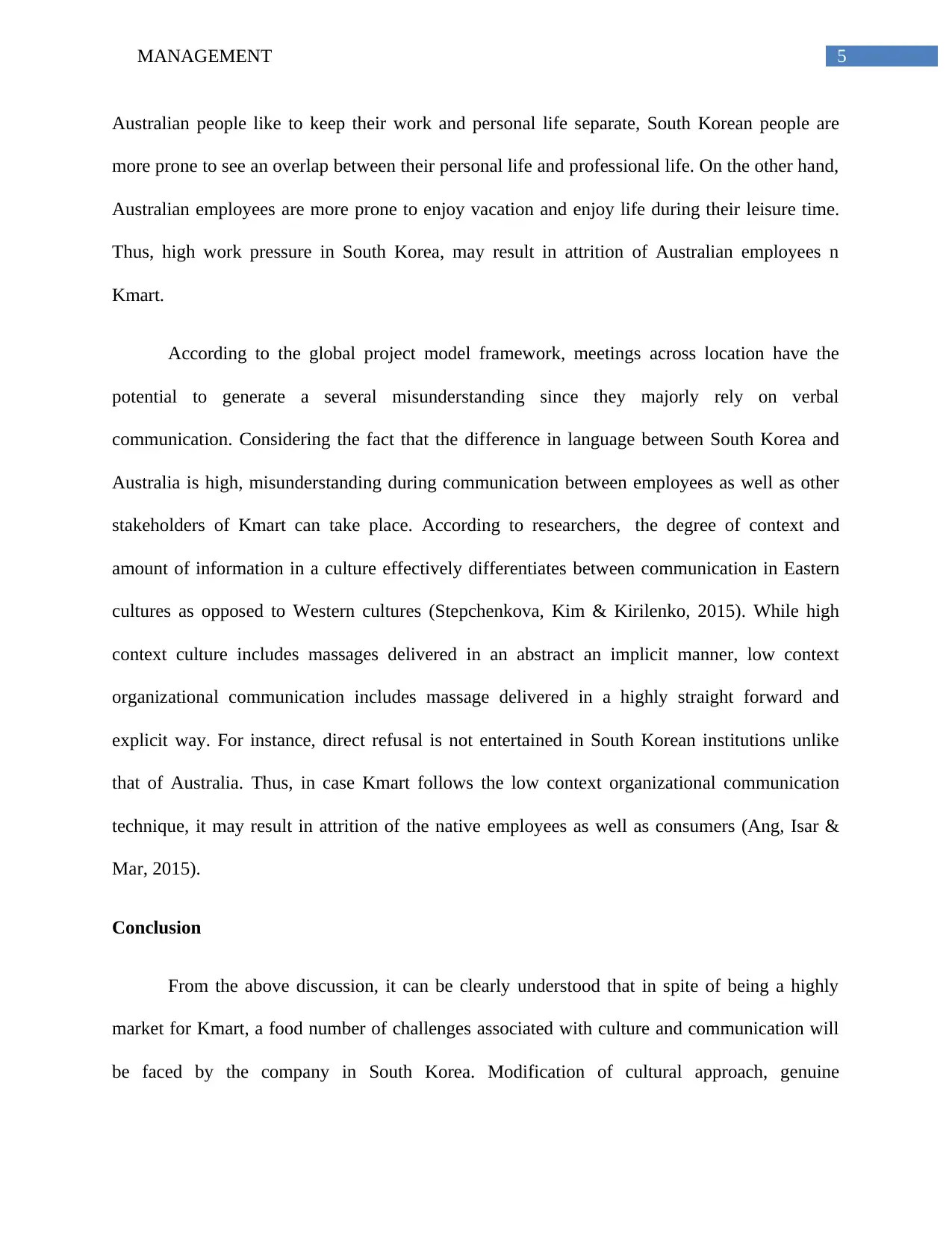
5MANAGEMENT
Australian people like to keep their work and personal life separate, South Korean people are
more prone to see an overlap between their personal life and professional life. On the other hand,
Australian employees are more prone to enjoy vacation and enjoy life during their leisure time.
Thus, high work pressure in South Korea, may result in attrition of Australian employees n
Kmart.
According to the global project model framework, meetings across location have the
potential to generate a several misunderstanding since they majorly rely on verbal
communication. Considering the fact that the difference in language between South Korea and
Australia is high, misunderstanding during communication between employees as well as other
stakeholders of Kmart can take place. According to researchers, the degree of context and
amount of information in a culture effectively differentiates between communication in Eastern
cultures as opposed to Western cultures (Stepchenkova, Kim & Kirilenko, 2015). While high
context culture includes massages delivered in an abstract an implicit manner, low context
organizational communication includes massage delivered in a highly straight forward and
explicit way. For instance, direct refusal is not entertained in South Korean institutions unlike
that of Australia. Thus, in case Kmart follows the low context organizational communication
technique, it may result in attrition of the native employees as well as consumers (Ang, Isar &
Mar, 2015).
Conclusion
From the above discussion, it can be clearly understood that in spite of being a highly
market for Kmart, a food number of challenges associated with culture and communication will
be faced by the company in South Korea. Modification of cultural approach, genuine
Australian people like to keep their work and personal life separate, South Korean people are
more prone to see an overlap between their personal life and professional life. On the other hand,
Australian employees are more prone to enjoy vacation and enjoy life during their leisure time.
Thus, high work pressure in South Korea, may result in attrition of Australian employees n
Kmart.
According to the global project model framework, meetings across location have the
potential to generate a several misunderstanding since they majorly rely on verbal
communication. Considering the fact that the difference in language between South Korea and
Australia is high, misunderstanding during communication between employees as well as other
stakeholders of Kmart can take place. According to researchers, the degree of context and
amount of information in a culture effectively differentiates between communication in Eastern
cultures as opposed to Western cultures (Stepchenkova, Kim & Kirilenko, 2015). While high
context culture includes massages delivered in an abstract an implicit manner, low context
organizational communication includes massage delivered in a highly straight forward and
explicit way. For instance, direct refusal is not entertained in South Korean institutions unlike
that of Australia. Thus, in case Kmart follows the low context organizational communication
technique, it may result in attrition of the native employees as well as consumers (Ang, Isar &
Mar, 2015).
Conclusion
From the above discussion, it can be clearly understood that in spite of being a highly
market for Kmart, a food number of challenges associated with culture and communication will
be faced by the company in South Korea. Modification of cultural approach, genuine
⊘ This is a preview!⊘
Do you want full access?
Subscribe today to unlock all pages.

Trusted by 1+ million students worldwide

6MANAGEMENT
demonstration of respect to the South Korean culture along with implementation of effective
strategies is highly required in order to deal with the mentioned issue. In the following
paragraph, effective strategies to deal with the potential cultural concerns that might hamper the
establishment and expansion of Kmart in South Korea have been discussed.
Recommendations
In order to deal with the mentioned issue, the following steps can be adopted:
1. In order to deal with the cultural barrier, Kmart needs to provide effective training as well
as education to its employees in or to gain basic idea of the English language and
eventually develop fluency in it
2. Several ice breaking sessions and incorporation of the celebration of South Korean
festivals should be done in order to demonstrate respect towards their culture.
3. Leaders and other share holders needs to be provided effective knowledge and education
in order to develop a detailed ides of how to provide leadership to South Korean
employees and deal with the stake holders.
In order to expand its business in South Korea, the Kmart organization can opt for the following
modes of entry.
1. This mode of entry involves directly exporting the goods as well as products to another
overseas market. Implementation of this mode will help the organization to select
efficient foreign representatives in the overseas market. Not only this, this strategy will
help the management to test their products inn the international market before committing
to a bigger investment. Along with this, this strategy will help Kmart to protect their
patents, trademarks goodwill ad other intangible assets.
demonstration of respect to the South Korean culture along with implementation of effective
strategies is highly required in order to deal with the mentioned issue. In the following
paragraph, effective strategies to deal with the potential cultural concerns that might hamper the
establishment and expansion of Kmart in South Korea have been discussed.
Recommendations
In order to deal with the mentioned issue, the following steps can be adopted:
1. In order to deal with the cultural barrier, Kmart needs to provide effective training as well
as education to its employees in or to gain basic idea of the English language and
eventually develop fluency in it
2. Several ice breaking sessions and incorporation of the celebration of South Korean
festivals should be done in order to demonstrate respect towards their culture.
3. Leaders and other share holders needs to be provided effective knowledge and education
in order to develop a detailed ides of how to provide leadership to South Korean
employees and deal with the stake holders.
In order to expand its business in South Korea, the Kmart organization can opt for the following
modes of entry.
1. This mode of entry involves directly exporting the goods as well as products to another
overseas market. Implementation of this mode will help the organization to select
efficient foreign representatives in the overseas market. Not only this, this strategy will
help the management to test their products inn the international market before committing
to a bigger investment. Along with this, this strategy will help Kmart to protect their
patents, trademarks goodwill ad other intangible assets.
Paraphrase This Document
Need a fresh take? Get an instant paraphrase of this document with our AI Paraphraser
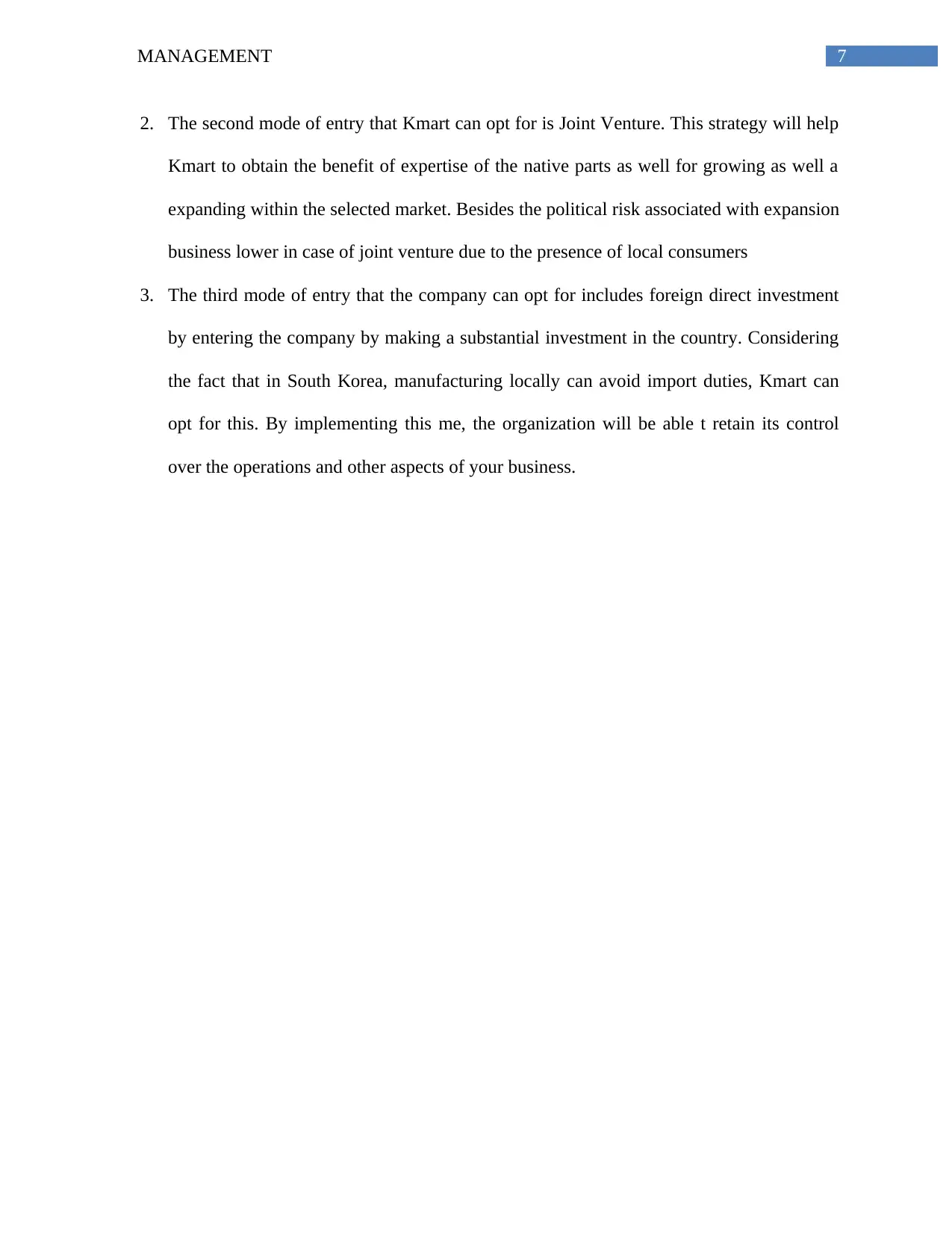
7MANAGEMENT
2. The second mode of entry that Kmart can opt for is Joint Venture. This strategy will help
Kmart to obtain the benefit of expertise of the native parts as well for growing as well a
expanding within the selected market. Besides the political risk associated with expansion
business lower in case of joint venture due to the presence of local consumers
3. The third mode of entry that the company can opt for includes foreign direct investment
by entering the company by making a substantial investment in the country. Considering
the fact that in South Korea, manufacturing locally can avoid import duties, Kmart can
opt for this. By implementing this me, the organization will be able t retain its control
over the operations and other aspects of your business.
2. The second mode of entry that Kmart can opt for is Joint Venture. This strategy will help
Kmart to obtain the benefit of expertise of the native parts as well for growing as well a
expanding within the selected market. Besides the political risk associated with expansion
business lower in case of joint venture due to the presence of local consumers
3. The third mode of entry that the company can opt for includes foreign direct investment
by entering the company by making a substantial investment in the country. Considering
the fact that in South Korea, manufacturing locally can avoid import duties, Kmart can
opt for this. By implementing this me, the organization will be able t retain its control
over the operations and other aspects of your business.
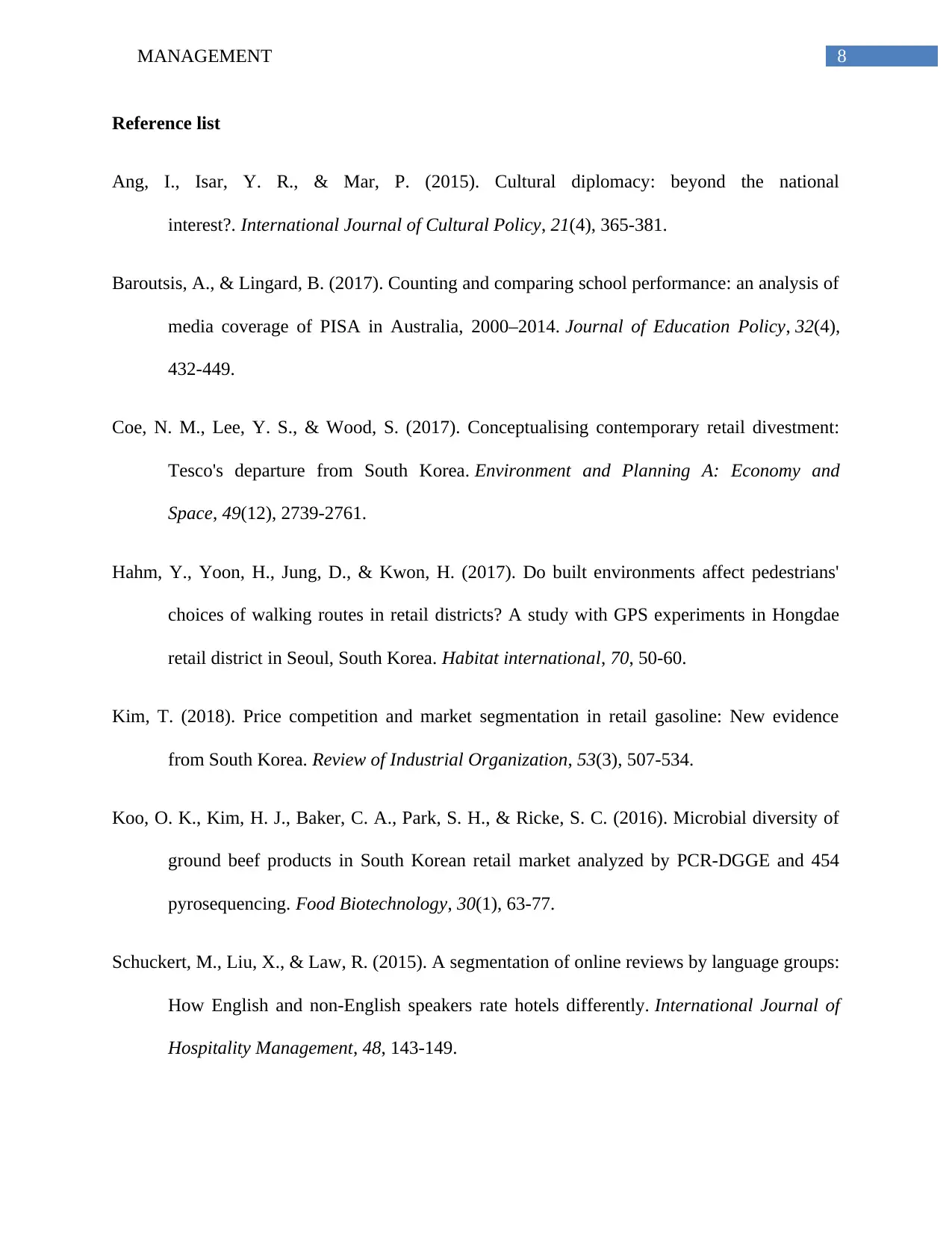
8MANAGEMENT
Reference list
Ang, I., Isar, Y. R., & Mar, P. (2015). Cultural diplomacy: beyond the national
interest?. International Journal of Cultural Policy, 21(4), 365-381.
Baroutsis, A., & Lingard, B. (2017). Counting and comparing school performance: an analysis of
media coverage of PISA in Australia, 2000–2014. Journal of Education Policy, 32(4),
432-449.
Coe, N. M., Lee, Y. S., & Wood, S. (2017). Conceptualising contemporary retail divestment:
Tesco's departure from South Korea. Environment and Planning A: Economy and
Space, 49(12), 2739-2761.
Hahm, Y., Yoon, H., Jung, D., & Kwon, H. (2017). Do built environments affect pedestrians'
choices of walking routes in retail districts? A study with GPS experiments in Hongdae
retail district in Seoul, South Korea. Habitat international, 70, 50-60.
Kim, T. (2018). Price competition and market segmentation in retail gasoline: New evidence
from South Korea. Review of Industrial Organization, 53(3), 507-534.
Koo, O. K., Kim, H. J., Baker, C. A., Park, S. H., & Ricke, S. C. (2016). Microbial diversity of
ground beef products in South Korean retail market analyzed by PCR-DGGE and 454
pyrosequencing. Food Biotechnology, 30(1), 63-77.
Schuckert, M., Liu, X., & Law, R. (2015). A segmentation of online reviews by language groups:
How English and non-English speakers rate hotels differently. International Journal of
Hospitality Management, 48, 143-149.
Reference list
Ang, I., Isar, Y. R., & Mar, P. (2015). Cultural diplomacy: beyond the national
interest?. International Journal of Cultural Policy, 21(4), 365-381.
Baroutsis, A., & Lingard, B. (2017). Counting and comparing school performance: an analysis of
media coverage of PISA in Australia, 2000–2014. Journal of Education Policy, 32(4),
432-449.
Coe, N. M., Lee, Y. S., & Wood, S. (2017). Conceptualising contemporary retail divestment:
Tesco's departure from South Korea. Environment and Planning A: Economy and
Space, 49(12), 2739-2761.
Hahm, Y., Yoon, H., Jung, D., & Kwon, H. (2017). Do built environments affect pedestrians'
choices of walking routes in retail districts? A study with GPS experiments in Hongdae
retail district in Seoul, South Korea. Habitat international, 70, 50-60.
Kim, T. (2018). Price competition and market segmentation in retail gasoline: New evidence
from South Korea. Review of Industrial Organization, 53(3), 507-534.
Koo, O. K., Kim, H. J., Baker, C. A., Park, S. H., & Ricke, S. C. (2016). Microbial diversity of
ground beef products in South Korean retail market analyzed by PCR-DGGE and 454
pyrosequencing. Food Biotechnology, 30(1), 63-77.
Schuckert, M., Liu, X., & Law, R. (2015). A segmentation of online reviews by language groups:
How English and non-English speakers rate hotels differently. International Journal of
Hospitality Management, 48, 143-149.
⊘ This is a preview!⊘
Do you want full access?
Subscribe today to unlock all pages.

Trusted by 1+ million students worldwide
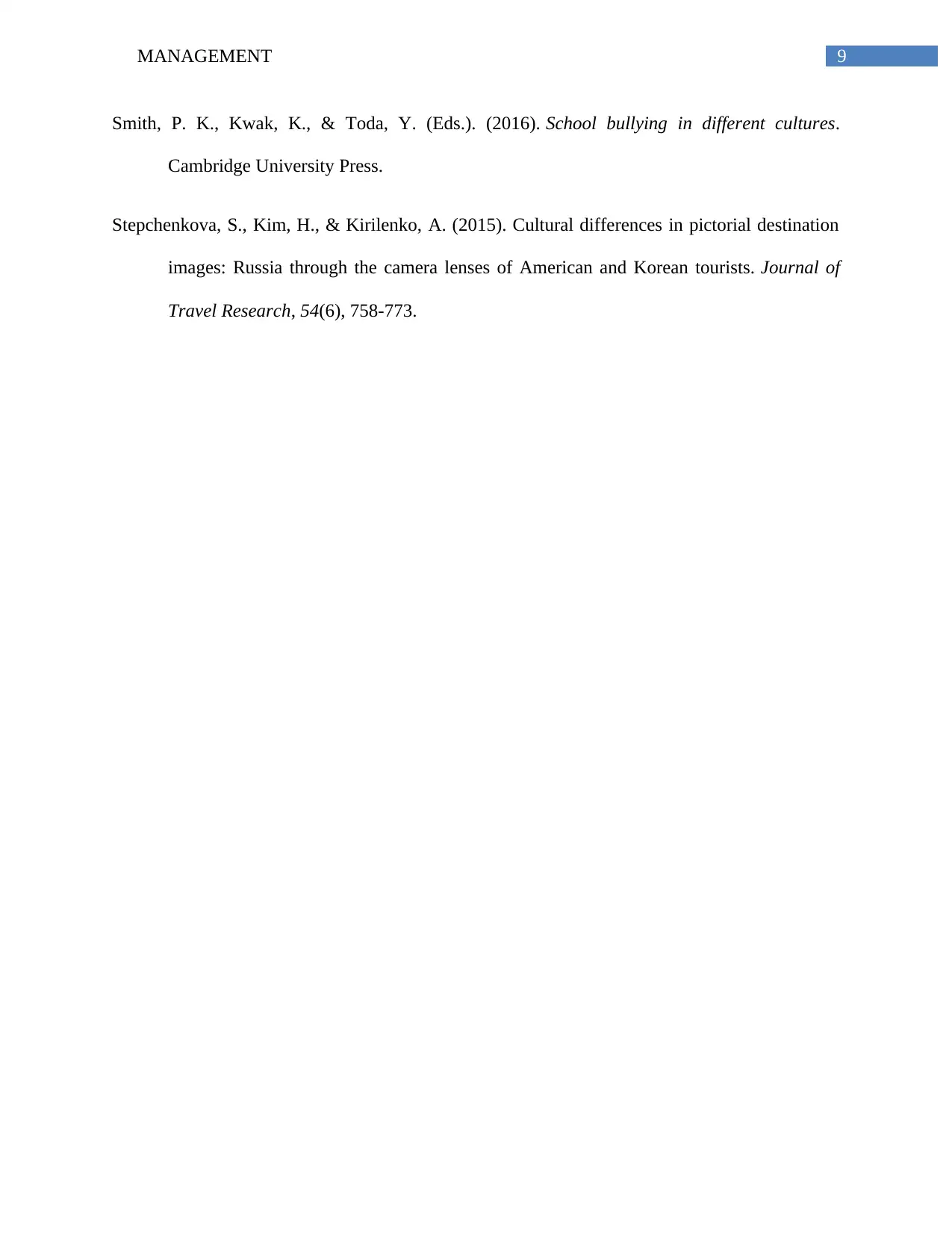
9MANAGEMENT
Smith, P. K., Kwak, K., & Toda, Y. (Eds.). (2016). School bullying in different cultures.
Cambridge University Press.
Stepchenkova, S., Kim, H., & Kirilenko, A. (2015). Cultural differences in pictorial destination
images: Russia through the camera lenses of American and Korean tourists. Journal of
Travel Research, 54(6), 758-773.
Smith, P. K., Kwak, K., & Toda, Y. (Eds.). (2016). School bullying in different cultures.
Cambridge University Press.
Stepchenkova, S., Kim, H., & Kirilenko, A. (2015). Cultural differences in pictorial destination
images: Russia through the camera lenses of American and Korean tourists. Journal of
Travel Research, 54(6), 758-773.
Paraphrase This Document
Need a fresh take? Get an instant paraphrase of this document with our AI Paraphraser
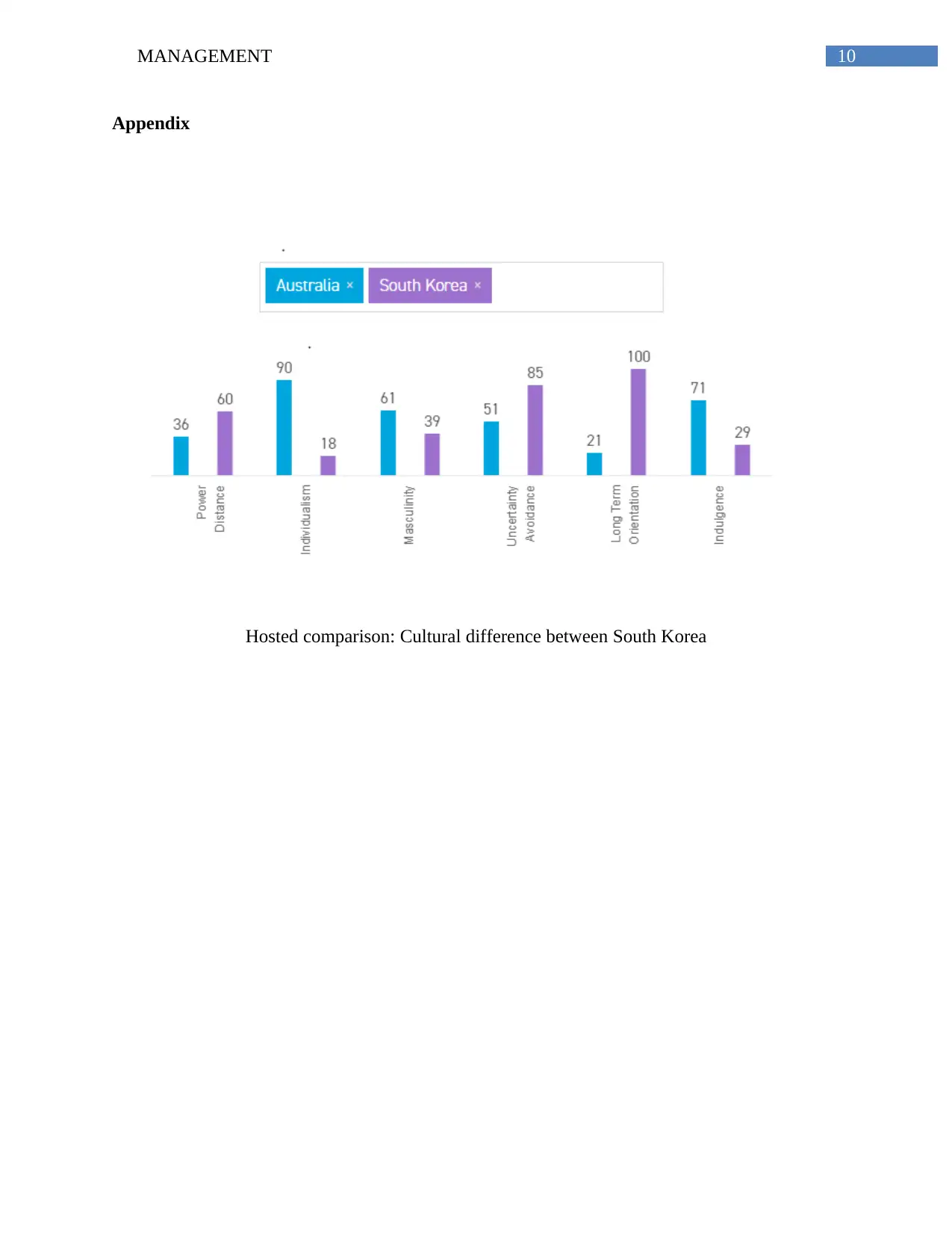
10MANAGEMENT
Appendix
Hosted comparison: Cultural difference between South Korea
Appendix
Hosted comparison: Cultural difference between South Korea
1 out of 11
Related Documents
Your All-in-One AI-Powered Toolkit for Academic Success.
+13062052269
info@desklib.com
Available 24*7 on WhatsApp / Email
![[object Object]](/_next/static/media/star-bottom.7253800d.svg)
Unlock your academic potential
Copyright © 2020–2026 A2Z Services. All Rights Reserved. Developed and managed by ZUCOL.




